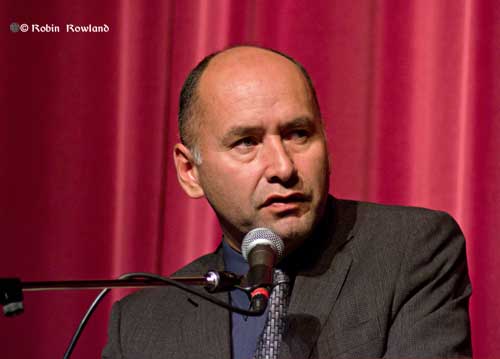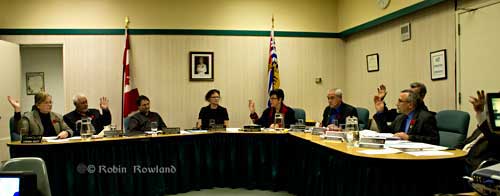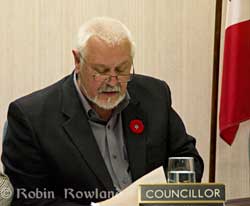In her column in The Calgary Herald, Nov 4, 2011 aimed at making the Northern Gateway Joint Review process quick, efficient and excluding a lot of people who want to make oral comments pro-pipeline columnist Deborah Yedlin raises once again what is a big deal for the mostly conservative Postmedia columnists. (See Part One of this analysis: Calgary Herald columnist advocates curbing free speech on Northern Gateway Hearings)
It could be called ” The Great American Energy Conspiracy,” which has apparently now gone international since a tiny minority of those wishing to give oral comments to the Northern Gateway Joint Review panel are not only from the United States, but from the United Kingdom and even Germany. Yedlin doesn’t want non-Canadians (at least non-Canadian environmentalists, no mention of oil executives flying up from Houston) to give oral testimony at the Joint Review Panel.
So where does this conspiracy originate? It was uncovered from the research by blogger Vivian Krause, who has detailed all the contributions made by US-based foundations to support environmental issues in Canada, especially on the bitumen sands, protecting the coastline and salmon farming.
Several Postmedia columnists, including Yedlin, go completely ballistic over this issue, quoting Krause as saying, in effect: How dare these foreigners interfere in a Canadian issue
(They don’t actually use the term foreigners)
Rockefeller Brothers Fund, Sea Change Foundation and San Francisco Oak Foundation. She will show you how these organizations have heavily funded the opposition to the oilsands in Canada.
To wit: a tax return filed for 2009 by Sea Change indicates $2 million was given to the Tides Foundation to be used for “promoting awareness and opposition to oilsands.”
(I should note here that Postmedia’s reporters continue with generally fair and accurate coverage of the pipeline issues, although the chain as a whole tends to tilt in favour of the energy industry)
Yedlin goes on to say
the involvement, nay, interference, by U.S. foundations in the development of Canada’s natural resources constitutes a violation of the North American Free Trade Agreement or of Canadian economic sovereignty.
Were the shoe on the other foot, and Canadian organizations were sending money to U.S. environmental concerns opposing development of, say, shale gas reserves, it’s a good bet steps would be taken in short order to shut it down.
Really?
Has the United States taken any steps to stop the millions of dollars Canadian corporations are spreading along Washington’s lobbying central, K Street, not to mention throughout the six western mountain and southern states the Keystone XL pipeline will cross, to promote that proposed pipeline?
Is the United States objecting to Ambassador Gary Doer crisscrossing the United States until he will equal George Clooney’s character in Up in the Air, building up frequent flier points lobbying in favour of the bitumen sands and cross continent pipelines?
Yedlin’s statement is the height of hypocrisy. For conservative columnists in Canada, it is unacceptable for American foundations to support the groups concerned environmental issues and opposing the bitumen sands. Yet apparently there is nothing wrong for Canadian companies to spend millions of dollars to lobby the United States on behalf of the Keystone XL pipeline:
The Globe and Mail reported on Oct. 20, 2011 that
In the past two years, TransCanada Corp. which is seeking to build the $7-billion pipeline, has spent over $1.5-million on U.S. federal lobbyists, and even more in individual states like Nebraska, where opposition has been the most vocal. That’s in addition to the money it has poured into advertising campaigns, which include a current print, TV and online effort in Washington, D.C., aimed at persuading decision makers that the pipeline will help “real Americans.”
TransCanada has been joined by the Canadian Association of Petroleum Producers (CAPP), which has marshalled the considerable connections of Gordon Giffin and David Wilkins, both former U.S. ambassadors to Canada, to press the case for the pipeline and the Alberta oil sands. The American Petroleum Institute has banded together with the Laborers International Union of North America to feed union workers and ferry them to public meetings, clothe them in orange shirts and ask them to make the case for the pipeline.
Now, of course, the United States is taking some action, with the Inspector General of the State Department investigating possible undue influence by TransCanada, as reported by the Globe and Mail.
The U.S. State Department’s Inspector-General on Monday launched a conflict-of-interest review of the pipeline’s permitting process to examine “the Department of State’s handling of the Environmental Impact Statement and National Interest Determination for TransCanada Corp.’s proposed Keystone XL permit process.”
The Inspector-General review comes after a request by several powerful U.S. senators, who questioned the impartiality of Cardno Entrix, the consultant hired to conduct the Keystone XL permitting process. Cardno Entrix has listed TransCanada as one of its major clients, raising conflict-of-interest concerns.
TransCanada denies any wrong doing and told the Globe
… spokesman James Millar welcomed the Inspector-General’s review “so that these latest claims by professional activists and lawmakers who are adamantly opposed to our pipeline project can be addressed.”
“At TransCanada, we conduct ourselves with integrity and in an open and transparent manner,” he wrote. “We are certain that the conclusion of this review will reflect that.”
Note that the Inspector General is not investigating the money that Canadian corporations and the Canadian government is showering on the United States, but the fact that a company that had worked for TransCanada was reviewing the company’s plans for the State Department. Is it just “professional activists and lawmakers” who perceive that as a conflict of interest?
In her column Yedlin says one of the foundations Krause has “exposed” has lobbied against Keystone.
Sea Change was apparently a signatory to a letter signed by 251 environmental organizations and sent to the U.S. State Department asking Secretary of State Hillary Clinton to block approval of the Keystone XL Pipeline
Just what is going on here? Sea Change is, as Krause and Yedlin point out, an American foundation. Now these two object to an American foundation lobbying the US Secretary of State on the issue of a bitumen sands pipeline crossing United States territory. Huh?
Why? Apparently this is all a giant conspiracy to cripple the Canadian energy economy:
it’s hard not to wonder if some of what is going on vis-a-vis Northern Gateway in particular is a (not so) veiled attempt by the U.S. foundations to ensure there is a wide differential between the continental North American price of oil price and the world price.
After all, low oil prices are better for the U.S. economy than are higher prices and what better way to do this than by cloaking oneself in an environmental cape?
So American environmental foundations, worried about the effects of a giant oil spill along our mutual coast, are secretly in the pocket of the American energy companies. Quick call Dan Brown and hire a boat to look for a Da Vinci Code among the petroglyphs along the cliffs of the Inside Passage and rocks on the shores of Douglas Channel.
Then there’s the issue of Chinese investment in the bitumen sands and various pipeline projects. Some of those millions of yuan will surely make their way into the lobbying funds used by Canadian energy companies. Apparently there’s nothing wrong with China having its hand in Canada’s natural resources, as long as they’re sending money to energy companies and not to environmental groups.
No conspiracy, just more hypocrisy.


 In September, Enbridge CEO Pat
In September, Enbridge CEO Pat
 Halyk then accused the current mayor, Joanne Monaghan of withholding information from the rest of
Halyk then accused the current mayor, Joanne Monaghan of withholding information from the rest of Monaghan replied by simply saying that she had had conversations with various industry representatives visiting Kitimat and that often those people visiting Kitimat had requested confidentiality. She emphasized that she had never signed a letter of intent without disclosing information to District Council.
Monaghan replied by simply saying that she had had conversations with various industry representatives visiting Kitimat and that often those people visiting Kitimat had requested confidentiality. She emphasized that she had never signed a letter of intent without disclosing information to District Council.